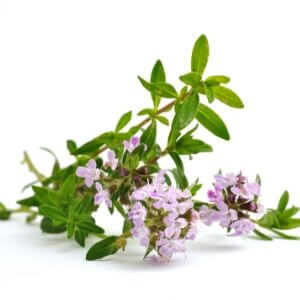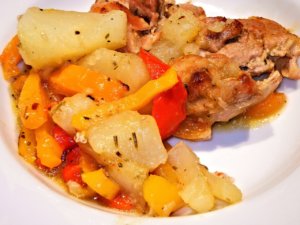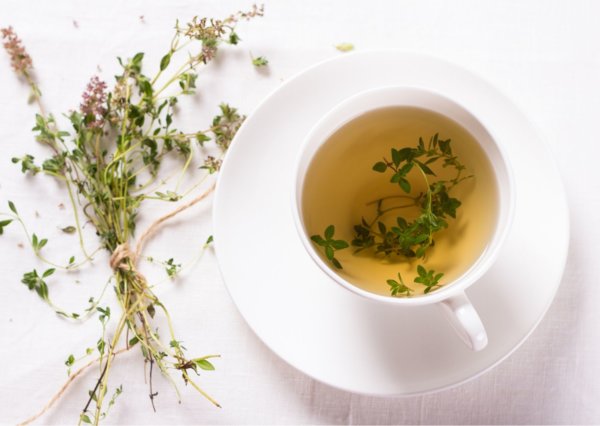Herb thyme is one of my favourite herbs of all and I’d like to share with you its many fantastic benefits and medicinal uses, so you can confidently include it in your home dispensary and as a first aid for sore throat, hoarse voice, cough, viral or fungal infections.
Thyme (Thymus vulgaris) is one of the most cultivated of all herbs and it’s been used medicinally for thousands of years. This classic kitchen herb belongs to the Mint plant family, and there are a number of species, most of them are used in cooking. It’s a perennial, evergreen, low-lying aromatic herb with a woody root, medicinal parts are the leaves and flowers.
Beyond its common culinary applications, thyme has been used by herbalists for a myriad of conditions, based upon its antimicrobial, antitussive (prevention or relief of cough), spasmolytic (spasms relieving) and antioxidant activity.
Traditional and Empirical Use of Thyme
Thyme’s benefits and medicinal uses were recognised and documented early on by various medicine practitioners.
Thyme was used medicinally by Hippocrates (known as the father of medicine) over 4,000 years ago and later by the 1st century Greek physician Dioscorides, as a treatment for respiratory disorders. The ancient Romans Virgil (poet) and Pliny (scientist) mentioned thyme as a meat preservative.
It was used as an antiseptic during plagues such as the bubonic plague of the 14th century Europe. The renowned 2nd century Greek physician Galen recognised the antimicrobial properties of thyme and used it in treatment of musculoskeletal disorders, including joint disorders. Apparently, medieval anatomists named the lymph gland in the chest the ‘thymus’ because it reminded them of a thyme flower!
Up until World War I, thyme (and in particular its main essential oil thymol) was widely used as an antiseptic. While thymol has largely been replaced by more potent antiseptics nowadays, it remains an ingredient in many products such as mouthwashes, including Listerine.
Benefits and Medicinal Uses of Thyme
Importantly, thyme is approved by The German Commission E [1] in the treatment of bronchitis, whooping cough and upper respiratory inflammation.
Thyme has many amazing benefits and medicinal uses including:
- Antitussive, expectorant and antispasmodic actions are considered to be the major pharmacological properties of thyme.
- The essential oil of thyme is key for its antimicrobial activity. The main active antimicrobial components in the essential oil are thymol and carvacrol.
- The herb is preferred to the oil as it’s safer to use. The oil is toxic and should not be ingested and only applied externally if diluted in a suitable carrier oil.
- All ear, nose and throat problems – thyme tea with or without a spoonful of raw honey is an excellent home remedy including colds, sinus congestion, sore throat and tonsillitis. The tea can be used first as gargle and then swallowed. See the recipe below.
- Cough and bronchial infections – thyme is an excellent cough remedy, producing expectoration and reducing spasm. It’s also
 an effective remedy for shortness of breath. Thyme brings relief to all manner of coughs and chest congestion, and can provide valuable support in asthma and whooping cough. It’s often combined with licorice and echinacea to support the immune system.
an effective remedy for shortness of breath. Thyme brings relief to all manner of coughs and chest congestion, and can provide valuable support in asthma and whooping cough. It’s often combined with licorice and echinacea to support the immune system. - Thyme can especially help in cases where coughing occurs in conjunction with spasmodic symptoms. When the herb is ingested, thyme oil is largely excreted via the lungs where the antispasmodic and antiseptic therapeutic effects occur at the site of the disease. The spasm relieving effect of thyme on the bronchioles is particularly significant.
- With its high content of volatile oil (predominantly thymol), thyme is used in dyspepsia and sluggish digestion.
- The oil is a strong antiseptic substance which explains many of thyme’s uses such as on infected wounds (as a lotion) but also internally for respiratory and digestive infections (as a tea or herbal extract). Thyme tea can be taken as a general tonic as well as to relieve indigestion and wind.
- The thyme essential oil [2] can be applied to fungal infections of the toenails. Use 1 drop per nail twice a day (caution: don’t use undiluted oil elsewhere and don’t take it internally – see Cautions below).
- The dried flowers have been often used in the same way as lavender, to protect linen from insects.
- Thyme tea prevents and alleviates menstrual cramps and period pain (dysmenorrhea). A 2014 study comparing use of thyme and ibuprofen for period pain suggested that thyme is effective in reducing the severity of pain and spasm in primary dysmenorrhea. [3]My comment: thyme helps period pain without any side-effects and also positively impacts breathing and digestion.
- Thymol also possesses anthelmintic (especially for hookworms) and anti-parasitic properties [4].
Culinary uses

Thyme is one of the four main herbs (others being sage, marjoram and parsley) that are often used together in a bouquet garni for flavouring soups, stews and hotpots. It gives the food wonderful aroma increasing appetite and stimulating digestion.
I find it goes well with lamb – when roasting lamb chops, put salt, pepper and chopped thyme between the meat and roast slowly in the oven.
Thyme also gives a lovely flavour to roast chicken. I have a favourite roast chicken recipe I’d like to share with you: Lemon, thyme and garlic quick roasted chicken [5]. Check it out, it’s the best!
Thyme Tea Recipe
As a tea, thyme makes a refreshing drink that counters infections and tones the respiratory system. As mentioned above, it’s useful in almost any problem affecting ears, nose, throat and chest. It disinfects the air passages, soothes coughing and stimulates clearance of phlegm.
The tea is made of thyme leaves, therefore it’s better to brew it quickly and drink it piping hot in order to gain the maximum vitamin content, which is lost rather quickly.
The general instructions are to take a teaspoon of dried herb (or 1 tablespoon of fresh herb) for every cup of water used.

To make a pot of thyme tea take the following:
- 2 tbsp chopped fresh thyme (or 2 tsp dried thyme)
- 1 tsp raw honey
- 1 tbsp lemon juice
Put thyme into a tea pot with a strainer. Add 1-3 cups of boiling water and steep, covered, for 8-10 minutes. Remove the plant material and stir in honey and lemon juice. Drink 2-3 times per day until you feel better.
If you find this tea too strong, dilute it with hot water after the tea is made. Many people find that 50/50 dilution is the most palatable. But for therapeutic purposes, a stronger concentration will induce the most desirable results.
You can add another herb or two if you find thyme tea’s taste too strong. Licorice, rosehip, lemon slice, a piece of orange peel or cinnamon work well. A bit of raw honey improves the taste immensely.
Have fun with your taste buds! Try this, try that and find your own blends to enjoy.
Cautions
As discussed, thyme has many benefits and medicinal uses, however, as with all herbs it needs to be used with respect and knowledge.
Thyme oil (thymol) is toxic and should be used with considerable caution. It should not be taken internally and only applied externally if diluted in a suitable carrier oil.
Thyme oil or higher intake of the herb are not recommended during pregnancy. No restrictions are known during lactation.
In Australia, thyme is not classified by the Therapeutic Goods Administration (TGA) and is freely available for sale. Thyme has been granted Generally Recognized as Safe (GRAS) status by the U.S. Food and Drug Administration (FDA).
Do you know of any other benefits and medicinal uses of thyme? Please share them in comments below!
Joanna Sochan
Wholistic Health and Lifestyle Therapist
Natural and Lifestyle Therapies for Abundant Health and Wellbeing
References
- Commission E Monographs – Thyme http://cms.herbalgram.org/expandedE/Thyme.html [7]
- Braun L, Cohen M. Herbs and natural supplements: an evidence-based guide, 4th ed. Sydney: Churchill Livingstone Elsevier, 2015.
- Van Den Broucke CO. The therapeutic value of Thymus species. Fitoterapia 1983; 4: 171–174.
- Van Den Broucke CO, Lernli JA. Pharmacological and chemical investigation of thyme liquid extracts. Planta Med 1981; 41: 129–135. https://www.thieme-connect.com/products/ejournals/abstract/10.1055/s-2007-971689 [8]
- Mills S, Bone K. Principles and Practice of Phytotherapy. Edinburgh: Churchill Livingstone, 2000.
- World Health Organization. WHO Monographs on Selected Medicinal Plants, vol 1. Geneva: World Health Organization, 1999.
- European Scientific Co-operative on Phytotherapy. ESCOP monographs. 2nd edition. Exeter, Stuttgart, New York: ESCOP, Georg Thieme Verlag, Thieme New York, 2003.
Additional resources
- Top 7 natural ‘antibiotics’ for flu, colds and coughs [9]
- Dandelion: a key herb for liver health, better digestion and beautiful skin [10]
- Know and love your herbs: Elderberry [11]
- Digestive first aid for bloating, indigestion, reflux, constipation or diarrhoea [12]
- Parasite treatment considerations: Blastocystis hominis and Dientamoeba fragilis [13]
Disclaimer: The above material is for informational and/or educational purposes only. It should not be used to self-diagnose and it is not a substitute for a medical advice, diagnosis, treatment, prescription or recommendation. All viewers of this content, especially those taking prescription or over-the-counter medications, should not make any changes in their health regimen or diet before first consulting a doctor or other qualified health provider with any questions they may have regarding a medical condition or their particular circumstances.

Joanna Sochan is a Natural Therapist and founder of Naturimedica Holistic Wellcare. She has a passion for helping clients transform their lives by becoming healthy and well naturally. Joanna has 12+ years experience in clinical practice and has special interest in solving complex cases, gut health, food sensitivities, hormone imbalances, autoimmune disorders and weight loss. She helps clients individually (mostly online) Australia-wide and also offers online therapeutic programs, eCourses and self-help eBooks. View full bio [14].